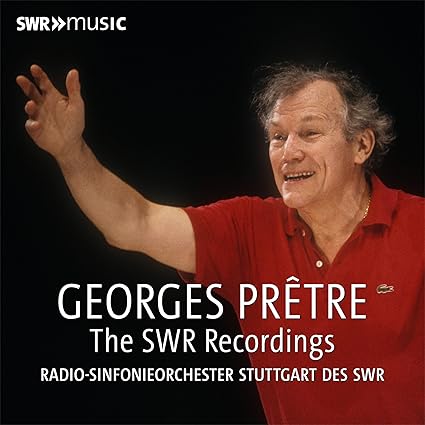

Ludwig van Beethoven (1770-1827): "Egmont" Overture, Op. 84 (1810) Ludwig van Beethoven (1770-1827): Symphony No. 3 in E flat major, Op. 55 (1802/03) Johannes Brahms (1833-1897): Symphony No. 1 in C minor, Op. 68 (1862-1877) Johannes Brahms (1833-1897): Four Hungarian Dances for Orchestra from WoO 1 (1869) Anton Bruckner (1824-1896): Symphony No. 4 in E flat major, WAB 104 (version from 1878/80) Hector Berlioz (1803-1869): Symphonie fantastique, Op. 14 (1830) Hector Berlioz (1803-1869): Ballet des Sylphes and Marche Hongroise from La Damnation de Faust, Op. 24 (1846) Maurice Ravel (1875-1937): Suite for Orchestra No. 2 - Daphnis et Chloé (1908-1912) Maurice Ravel (1875-1937): La Valse - Poème chorégraphique pour orchestre (1906/1920) George Bizet (1838-1875): Symphony in C major (1855) Antonin Dvorak (1841-1904): Symphony No. 9 in E minor, Op. 95 "From the New World" (1893) Gustav Mahler (1860-1911): Totenfeier. Sinfonische Dichtung für groβes Orchester (1888) Ottorino Respighi (1879-1936): Fontane di Roma - Sinfonische Dichtung | Symphonic Poem (1916) Ottorino Respighi (1879-1936): I Pini di Roma - Sinfonische Dichtung | Symphonic Poem (1924) Igor Stravinsky (1882-1971): L'Oiseau de feu (Suite 1919) Richard Strauss (1864-1949): Rosenkavalier Suite, Op. 59 (1945) Richard Strauss (1864-1949): Till Eulenspiegel's Merry Pranks, Op. 28 (1894/95) Richard Strauss (1864-1949): Don Juan, Op. 20 (1888)
If you are, like me, a listener who associates Georges Prêtre mainly with opera recordings, then this set is a well-timed corrective. Of course, he would not be the first or last conductor whose recorded legacy is only a partial reflection of their real repertoire, but in this case the 8-CD set gives an excellent picture of his qualities as an orchestral conductor (no vocal elements in this set), with works from early/mid 19th century to 20th century. Many compositions are orchestral showpieces and exploit many aspects of instrumental color, and include trademark French classics as well as some from Beethoven, Brahms, Bruckner and others.
The selections are presented in roughly chronological order, live recordings with only very limited audience noise, all at least well recorded (they vary a little from location to location), and always at least good playing from an orchestra I have found to produce excellent recordings in the main. I have greatly enjoyed their recordings under Norrington and Marriner, less so the earlier ones under the controversial Celibidache but more based on sometimes eccentric interpretations than playing standards. No formal historically informed performances here, but straightforward, mainly quite brisk likeable performances.
From the muscular opening of the Egmont Overture, through to the luscious sounding Richard Strauss on the final disc, the set shows Prêtre to be a sensitive interpreter alert to the opportunities for appropriate excitement or gentleness when called for. The nature of this release probably means its market is primarily followers of the conductor or the orchestra, but given the quality of the recording, playing and conducting and the selection of real masterpieces it makes for an enjoyable listen from start to finish for any listener. Maybe the Respighi and Bizet are more minor masterpieces than the rest, but they all represent composition of a very high order.
Some highlights. The Eroica funeral march, starting almost immediately after the spirited opening movement is very well delivered. I love particularly how near the end, he lets the tempo slow gradually for a while, making one feel the world is gradually unravelling. It is a small aspect, but very telling.
One thing I noticed as a general reaction - Each performance seemed not extreme at all, but I was always conscious of there being a conductor molding the phrases, sometimes very obviously (try first Brahms Hungarian Dance middle section). Its normally done with a good sense of taste but found a few a little too much, examples noted below.
Some other high points, the French pieces (Berlioz, Bizet, Ravel) are done with a nice sense of French flair. Prêtre never felt he was really appreciated in his own country as much as in Germany/Austria and Italy. These performances are a nice reminder of his love of his own country's masterpieces and his desire to actively manage the performance. Case in point, first movement of the Berlioz. He starts on the leisurely side, and then in the transition to the faster part of the movement he slows down a little more, which draws attention to the contrast that follows. But then, in the second movement I found some of the momentary slowing down in phrases near the end a little intrusive. It is followed by a very nice third movement in the country, and the fourth March to the Scaffold was very nicely done I thought, and witches sabbath also well done. The Ravel was excellent with a tremendous daybreak climax in Daphnis and a nice swing in La Valse. The Bizet performance has real charm (it's a delicious work).
I also loved the Stravinsky and Strauss selections. Tremendous pieces of course, showpieces for the orchestra like several of the pieces in this collection. The Strauss Der Rosenkavalier Suite benefits from his familiarity of the opera (conducted live and on record), it is lovingly massaged.
I got a lot of pleasure from this set as well as an enhanced appreciation for the conductor - so if the conductor, orchestra or compositional selections interest you, I would go ahead.
Some useful notes in the booklet about the orchestra and conductor, not so much about the works themselves, but they are all well-known so there is plenty available on the internet.
Ian Orbell - August 2024 Richard Strauss - Rosenkavalier Suite